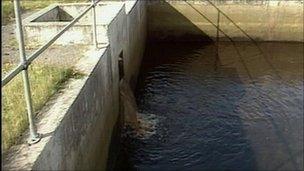Camelford poisoning water boss 'tried to avoid panic'
- Published

Carole Cross, who died in 1994, had large amounts of aluminium in her brain
The true cause of a major water poisoning was withheld to prevent a public panic, an inquest has heard.
The drinking supply to 20,000 homes in Camelford became toxic when 20 tonnes of aluminium sulphate were accidentally added to the water supply.
The boss of the South West Water Authority (SWWA) said he did not want to create "undue alarm" by telling people in the north Cornwall area.
The Somerset inquest is looking into the death of 59-year-old Carole Cross.
She lived in Camelford at the time of the incident in 1988, but moved to Dulverton in Somerset two years later.
When Mrs Cross died in 2004, tests showed high amounts of aluminium in her brain.
Earlier, environmental health officer Richard Zorachack told the inquest the cause was withheld from him for three weeks, which he described as "shockingly late".
He said the water authority had kept the council "in the dark".
Community Health Officer Dr Richard Granger said if he had known earlier, he would have ordered the mains water supply to be shut off.
The poisoning happened when a relief driver added aluminium sulphate to the wrong tank at the Lowermoor works, where no-one was on site to direct him.
It caused health problems, including cramps, rashes, diarrhoea and ulcers.
The only person to lose his job after the poisoning was John Lewis, a water authority manager.
Giving evidence on Tuesday, Mr Lewis said the SWWA knew within 48 hours the chemical was the likely cause.
He said he was given "specific instructions" not to tell and was made a "100% scapegoat".

Effects of the water poisoning included cramps, rashes, diarrhoea and mouth ulcers
Mr Court, from Sussex, SWWA's former chairman and chief executive, denied the accusation, telling the inquest he had never instructed staff to keep quiet.
West Somerset coroner Michael Rose told Mr Court: "I have a feeling the authority may well have been trying to keep the true nature of the incident from the public.
"There was a feeling amongst the junior members of staff they had solved the problem by flushing and everything was all right and there was no need to tell anyone."
Mr Court said he had pressed upon staff the importance of speaking to the driver, although the inquest heard he did not return to Cornwall until six days after the poisoning.
When the coroner suggested SWWA had been "lethargic" about speaking to the driver, Mr Court agreed it was "unsatisfactory".
The original inquest was adjourned two years ago, when the coroner asked for more tests into aluminium and brain disease links.
The hearing continues.
- Published2 November 2010
- Published1 November 2010
- Published1 November 2010